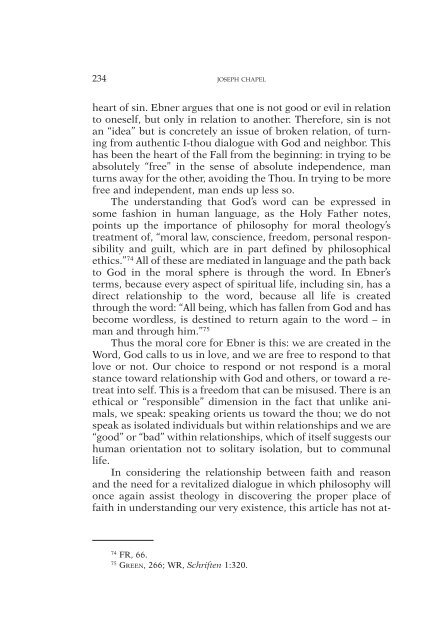Avant-propos - Studia Moralia
Avant-propos - Studia Moralia
Avant-propos - Studia Moralia
Create successful ePaper yourself
Turn your PDF publications into a flip-book with our unique Google optimized e-Paper software.
234 JOSEPH CHAPEL<br />
heart of sin. Ebner argues that one is not good or evil in relation<br />
to oneself, but only in relation to another. Therefore, sin is not<br />
an “idea” but is concretely an issue of broken relation, of turning<br />
from authentic I-thou dialogue with God and neighbor. This<br />
has been the heart of the Fall from the beginning: in trying to be<br />
absolutely “free” in the sense of absolute independence, man<br />
turns away for the other, avoiding the Thou. In trying to be more<br />
free and independent, man ends up less so.<br />
The understanding that God’s word can be expressed in<br />
some fashion in human language, as the Holy Father notes,<br />
points up the importance of philosophy for moral theology’s<br />
treatment of, “moral law, conscience, freedom, personal responsibility<br />
and guilt, which are in part defined by philosophical<br />
ethics.” 74 All of these are mediated in language and the path back<br />
to God in the moral sphere is through the word. In Ebner’s<br />
terms, because every aspect of spiritual life, including sin, has a<br />
direct relationship to the word, because all life is created<br />
through the word: “All being, which has fallen from God and has<br />
become wordless, is destined to return again to the word – in<br />
man and through him.” 75<br />
Thus the moral core for Ebner is this: we are created in the<br />
Word, God calls to us in love, and we are free to respond to that<br />
love or not. Our choice to respond or not respond is a moral<br />
stance toward relationship with God and others, or toward a retreat<br />
into self. This is a freedom that can be misused. There is an<br />
ethical or “responsible” dimension in the fact that unlike animals,<br />
we speak: speaking orients us toward the thou; we do not<br />
speak as isolated individuals but within relationships and we are<br />
“good” or “bad” within relationships, which of itself suggests our<br />
human orientation not to solitary isolation, but to communal<br />
life.<br />
In considering the relationship between faith and reason<br />
and the need for a revitalized dialogue in which philosophy will<br />
once again assist theology in discovering the proper place of<br />
faith in understanding our very existence, this article has not at-<br />
74 FR, 66.<br />
75 GREEN, 266; WR, Schriften 1:320.

















